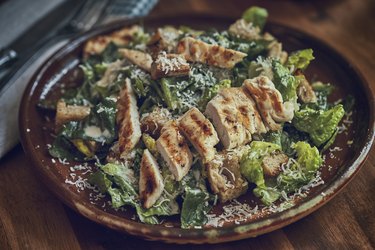
Although Greek yogurt gets all the love when it comes to healthy yogurts, another type — skyr (pronounced "skeer") — should stay stocked on your fridge shelf, too. This notable Nordic variety is not only known for its high protein and lower carb content (among other health perks), but it's also thick and creamy (yum).
Here, Frances Largeman-Roth, RDN, author of Smoothies & Juices: Prevention Healing Kitchen: 100+ Delicious Recipes for Optimal Wellness, shares why you should give skyr a shot on your next grocery run.
Video of the Day
Video of the Day
First Things First, What Is Skyr?
"Skyr is an Icelandic-style yogurt that dates to the ninth century," Largeman-Roth says. "And technically, it's not yogurt at all." That's right, it's actually cheese.
"Skyr is traditionally made by taking skim milk (after the cream has been separated) and warming it with live cultures until thickened," Largeman-Roth says. The kinds of live cultures added will determine a skyr's distinct texture and flavor, she says.
After this step, the whey is separated. "The whey can either be poured off or stirred back into the skyr to make it thinner," Largeman-Roth says.
Sometimes, brands may incorporate cream into the recipe, as well as fruit and other ingredients to create different flavors, she says.
Skyr vs. Greek Yogurt
While both skyr and Greek yogurt are thick, creamy and rich in protein, they are made quite differently. To make Greek yogurt, the whey is simply strained. On the other hand, to achieve its signature texture and high protein concentration, producing skyr involves cooking down large amounts of milk, Largeman-Roth says.
Compared to Greek yogurt, skyr is less tangy and a bit creamier, too — so if you're not a fan of Greek yogurt's tang, skyr might become your new go-to.
Skyr Nutrition Facts
One container (5.3 ounces) of plain skyr yogurt made with skim milk contains:
- Calories: 120
- Fat: 2.5 g
- Saturated fat: 1.5 g
- Cholesterol: 10 mg
- Sodium: 55 mg
- Total carbs: 8 g
- Dietary fiber: 0 g
- Sugar: 3 g
- Added sugar: 0 g
- Protein: 17 g
Vitamins, Minerals and Other Micronutrients
- Calcium: 15% of your Daily Value (DV)
- Vitamin A: 6% DV
- Potassium: 6% DV
The Health Benefits of Skyr
1. It’s Low in Saturated Fat
"While other types of fat are generally considered healthy, saturated fat is still something we should cut back on because it can raise the level of LDL [i.e., bad] cholesterol in the blood, contributing to heart disease risk," Largeman-Roth says.
Because skyr is traditionally made with skim milk, it doesn't contain much saturated fat. One container usually has around 1.5 grams of saturated fat, she says.
2. It May Be a Good Option for People With Diabetes
We all require carbohydrates, which provide us with essential energy. But some people with certain medical conditions need to watch their carb intake for their overall health.
"If you have prediabetes, diabetes (or are simply cutting back on carbs for other reasons), skyr may be a good choice," Largeman-Roth says.
"While the specific amount of carbohydrates will vary with each brand of skyr (it's generally 8 to 14 grams), it typically contains fewer carbs than regular yogurt, which supplies around 20 grams per serving," she says.
3. It’s High in Protein
"Protein is a macronutrient that helps us build and maintain muscle and also helps us feel satisfied longer," Largeman-Roth says. This is why incorporating this mighty macro into each meal and snack is a smart strategy.
And eating skyr is a stellar way to do just that. "With so much milk going into the skyr-making process, the protein becomes concentrated," Largeman-Roth says. In other words, each serving of skyr is densely populated with protein.
"Protein content can vary, but you'll find between 12 and 19 grams in each cup of skyr," she says.
4. It’s Rich in Calcium
"Calcium is not only important for healthy bones and teeth, but it's also necessary for your heart, muscles and nerves to function properly," Largeman-Roth says.
Snacking on skyr offers you oodles of calcium. Here's why: "Because skyr is made with so much milk (4 to 5 cups per cup of skyr), it has a concentrated amount of calcium," Largeman-Roth says.
"One serving may range from 130 to 170 milligrams of calcium," she adds.
For reference, it's recommended that adults between the ages of 19 and 50 get 1,000 milligrams of calcium per day, according to the National Institutes of Health (NIH). That means a single serving of skyr can supply as much as 17 percent of your daily calcium needs. Not too shabby.
5. It’s Rich in Probiotics
As a fermented dairy food, skyr is marvelous for your microbiome as it's a great source of probiotics. These beneficial bacteria promote good gut health by improving digestion and nutrient absorption, Largeman-Roth says.
"Since gut health is so vital to our overall health and immunity, it's important to include foods with probiotics several times a week, if not daily," she says.
And it's simple to achieve this when you snack on skyr.
Skyr Brands to Try
- Siggi’s Icelandic Strained Mixed Berry Yogurt ($1.79 on Amazon.com)
- Icelandic Provisions Vanilla Skyr Yogurt ($1.79 on Target.com)
- Thor's Skyr Traditional Icelandic Style Yogurt, Plain ($1.69 on Giantfoodstores.com)
- Painterland Sisters Organic Blueberry Lemon Skyr Yogurt ($2.99 on Painterlandsisters.com)
Was this article helpful?
150 Characters Max
0/150
Thank you for sharing!
Thank you for your feedback!


